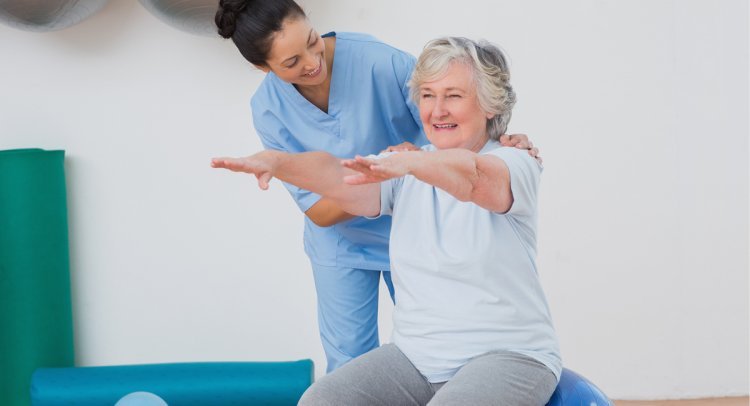The Transformative Benefits of Stroke Rehabilitation
Stroke rehabilitation is a crucial aspect of recovery for individuals who have experienced a stroke. This comprehensive treatment

Stroke rehabilitation is a crucial aspect of recovery for individuals who have experienced a stroke. This comprehensive treatment approach aims to help stroke survivors regain independence, improve their quality of life, and enhance their overall well-being. By focusing on physical, cognitive, and emotional aspects, stroke rehabilitation treatment in Hyderabad offers a multitude of benefits that can positively impact a person's recovery journey.
Understanding Stroke Rehabilitation:
Stroke, often referred to as a "brain attack," occurs when blood flow to the brain is disrupted, leading to damage in brain cells. The effects of a stroke can vary widely depending on the severity and location of the brain injury. Stroke rehabilitation is a specialized form of therapy designed to address the physical, cognitive, and emotional challenges that may arise after a stroke.
Benefits of Stroke Rehabilitation:
- Physical Recovery:
Hemiparesis and hemiplegia, common conditions among stroke survivors, refer to weakness or paralysis on one side of the body, typically resulting from damage to the brain. In stroke rehabilitation, physical therapy plays a pivotal role in addressing these challenges by targeting specific areas such as strength, coordination, balance, and mobility. Through a tailored regimen of exercises and interventions, individuals work towards regaining lost function and independence in their daily activities.
Physical therapists focus on strengthening weakened muscles, improving coordination to enhance movement precision, enhancing balance to prevent falls, and promoting mobility to facilitate tasks like walking and self-care. By engaging in targeted exercises that address these physical impairments, stroke survivors can gradually improve their motor skills, regain confidence in their abilities, and enhance their overall quality of life. The goal of physical therapy in stroke rehabilitation is to maximize functional recovery, promote independence, and support individuals in reintegrating into their daily routines with improved physical capabilities.
- Improved Mobility:
Mobility is a key aspect of independence and quality of life. Stroke rehabilitation helps individuals relearn how to walk, use assistive devices, and navigate their environment safely. By addressing mobility challenges early on, stroke survivors can enhance their ability to perform daily tasks and engage in social activities.
- Enhanced Communication Skills:
Many stroke survivors experience communication difficulties, such as aphasia, which affects language processing and expression. Speech therapy is a vital component of stroke rehabilitation that helps individuals regain speech and language skills. By working with speech therapists, stroke survivors can improve their ability to communicate effectively.
- Cognitive Rehabilitation:
Cognitive impairments, such as memory loss, attention deficits, and executive dysfunction, are common after a stroke. Cognitive rehabilitation focuses on improving cognitive skills through various techniques and strategies. By addressing cognitive challenges, individuals can enhance their problem-solving abilities and regain independence in daily living.
- Emotional Support:
Coping with the physical and emotional changes following a stroke can be challenging. Stroke rehabilitation at a sport rehab center in Hyderabad provides emotional support through counseling, support groups, and mental health interventions. By addressing emotional well-being, individuals can better cope with stress, anxiety, and depression, leading to a more positive outlook on recovery.
- Prevention of Secondary Complications:
Stroke survivors are vulnerable to secondary complications like muscle contractures, pressure ulcers, and deep vein thrombosis due to the physical impact of a stroke on their bodies. These complications can arise from immobility, reduced sensation, and impaired circulation, posing significant risks to the individual's health and well-being. Rehabilitation plays a crucial role in preventing these complications by focusing on proactive measures such as maintaining proper positioning to prevent muscle contractures, implementing skincare protocols to reduce the risk of pressure ulcers, and promoting mobility to prevent deep vein thrombosis.
By addressing these issues early and effectively, rehabilitation aims to mitigate the development of secondary health problems that can hinder the recovery process and impact the individual's quality of life. Through a comprehensive approach that includes physical therapy, occupational therapy, and specialized interventions, stroke survivors can minimize the risk of these complications and work towards a smoother and more successful recovery journey.
- Enhanced Quality of Life:
Stroke rehabilitation is a comprehensive treatment approach designed to address the physical, cognitive, and emotional challenges faced by individuals who have experienced a stroke. By focusing on restoring mobility, maximizing independence in daily activities, strengthening communication and cognitive skills, and providing mental health support, stroke rehabilitation aims to enhance the overall quality of life for stroke survivors.
Through personalized therapy plans that may include physical, occupational, and speech therapies, rehabilitation helps individuals regain lost abilities, adapt to permanent disabilities, and learn alternative ways to accomplish daily tasks. By addressing communication difficulties, cognitive impairments, and emotional changes, stroke survivors can improve their ability to interact with others, enhance problem-solving skills, and cope with emotional challenges post-stroke. Ultimately, stroke rehabilitation empowers individuals to regain independence, engage in meaningful activities, and rebuild their self-worth, leading to a higher level of functioning and overall well-being in their recovery journey.
Stroke rehabilitation at Ayurdha Rehab plays a vital role in the recovery journey of individuals who have experienced a stroke. By addressing physical, cognitive, and emotional challenges, rehabilitation helps individuals regain independence, improve their quality of life, and enhance their overall well-being. Through a multidisciplinary approach that focuses on personalized care and support, stroke survivors can unlock their potential for recovery and lead fulfilling lives post-stroke.
What's Your Reaction?










![Blog Submission Sites 2024 [High DA]](https://blognow.co.in/uploads/images/202306/image_100x75_6494a03eaff5e.jpg)
![Article Submission Sites 2023 [High DA & PA]](https://blognow.co.in/uploads/images/202307/image_100x75_64c4181f17036.jpg)
![Classified Submission Sites 2023 [High DA & PR]](https://blognow.co.in/uploads/images/202306/image_100x75_649dcd5260808.jpg)




![Article Submission Sites 2023 [High DA & PA]](https://blognow.co.in/uploads/images/202307/image_750x415_64c4181f08ed5.jpg)
![Classified Submission Sites 2023 [High DA & PR]](https://blognow.co.in/uploads/images/202306/image_750x415_649dcd5247eeb.jpg)
![Blog Submission Sites 2024 [High DA]](https://blognow.co.in/uploads/images/202306/image_750x415_6494a03e96bfa.jpg)